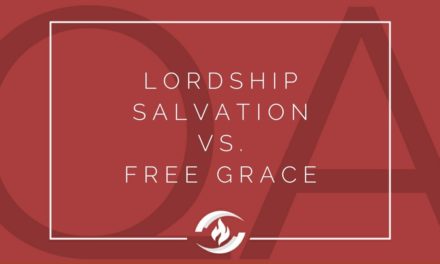Q.
God is sovereign and, in His sovereignty, has given man a free will to choose or reject Christ the Savior, a statement often made that seems to limit God’s sovereignty to man. Your thoughts.
Buddy
A.
Hello Buddy,
Thanks for the intriguing question. Many have pondered it. Several thoughts speak into the matter.
First, when it comes to the sovereignty of God, there is no debate. God is sovereign. He reigns over all. The question is whether that reign is pre-deterministic or whether God in His sovereignty has given man a free will.
Second, that God in His sovereignty chose to give man a truly free will seems evident for several reasons.
God created mankind in His image (Gen. 1:27). To be made in the image of God includes freedom. God, in His infinite wisdom, chose not to make man a robot or an automaton because without free will, man could not be an imager.
Furthermore, in Genesis 2, God told Adam and Eve they could “freely” eat of every tree but one. They were free to exercise their will and choose among the vast variety of trees, but they were instructed to choose to not eat of the one tree. These choices provided an opportunity to show their love for and trust in God. Without free choice there could be no way to love God. God desired a love relationship, not robotic ritual. Without free will, love is impossible. That the choice was real is obvious based on Adam’s wrong choice.
Finally, making man truly free, capable of failure and rebellion, makes clear that God is not the author of sin. If humans are predetermined to sin from the beginning, then God’s goodness is in question.
Third, when it comes to “limitations,” it seems the answer is both yes and no. Yes, in the sense that God in His infinite wisdom chose to allow man’s choices to limit what He would or would not do based on their faith choices. Psalm 78:41 says, “Yea, they turned back and tempted God, and limited the Holy One of Israel.” In Matthew 13:58, Jesus “did not many mighty works there because of their unbelief.”
But, no, in the sense that God still operates beyond that which He gave man the responsibility to depend on Him for. The sun still rises. God sustains His creation regardless of man’s choices. God will still accomplish His overall purpose. But He does not need to make man robotic and move in such a way as to make man’s choices inevitable. That would be a small, not so sovereign God. Rather, God gives man a free will and yet still works His overall will through, and even in spite of, man’s choices.
We’d love to hear your thoughts on this subject in the comments section below! If you have a question on another subject, we welcome you to make a submission by clicking here:












Good, concise answer. Praise God for His unspeakable gift!
Amen!
Sovereignty of God and free will of man: If God gives free will to man, and man is “spiritually dead in trespasses and sins” (Eph 2), how can he(man) make a spiritual decision unless God gives him the faith to believe/receive/accept via the Holy Spirit who opens his spiritually blind eyes (2 COR. 4:4).
If lost man in his own will (volition) can make the decision, for or against his eternal state, then it seems God in his Sovereignty is limited to fickle will of men.
Good questions. First “dead in trespasses and sins” does not speak of a corpse because unsaved man is revelling in trespasses and sins. The practical essence of death is separation. For example, physical death is when the immaterial part of man separates from the material. Spiritually, unsaved man’s spirit is separated from God (alienated from the life of God) and joined to indwelling sin (not sins, but that something in man that urges toward committing sins). Thus, unregenerated man is dead to God and alive to sin (dead in trespasses and sins). But Christ died unto sin (Rom. 6:10). One… Read more »
i find it interesting your comment “First “dead in trespasses and sins” does not speak of a corpse because unsaved man is revelling in trespasses and sins.”, I find it interesting as well that the same word “νεκρός”(Strong’s Number G3498 matches the Greek νεκρός (nekros) is used for physically dead throughout the NT as in Eph. 2:1.
Good observation. However, physical death is not limited to the concept of a corpse, though in physical death it includes it. There is the greater matter of the separation of the soul from the body. Thus the terminology of “the departed.” Yet, the usage in Ephesians 2:1 is obviously not addressing physical death. Since physical death is the separation of the soul from the body, then it follows that the “dead” part of a living person is the human spirit which is labeled “the old man.” The scriptural designation “old man” does not indicate the idea of a corpse. The… Read more »
Thanks John for the discussion and input. One can readily see why this (and similar) discussion(s) go all the way back to Augustine.
That is so true. Thanks for your good spirit, Baddy, and great questions.
Great discussion! God is sovereign and intervenes in our lives and world through: the Holy Spirit, by His written Word, by angels, by natural events (droughts, etc.), by dreams and visions, by miracles, by His redeemed people, even by lost and pagan nations, by Israel, and the greatest intervention the incarnation of God the Son! The Bible is the record of God involvled is His world. In all theses ways God is calling to us to respond freely and by choice. In none of these does He trample upon our freedom to choose.
Yes: divine initiation, human responsibility, divine enablement.